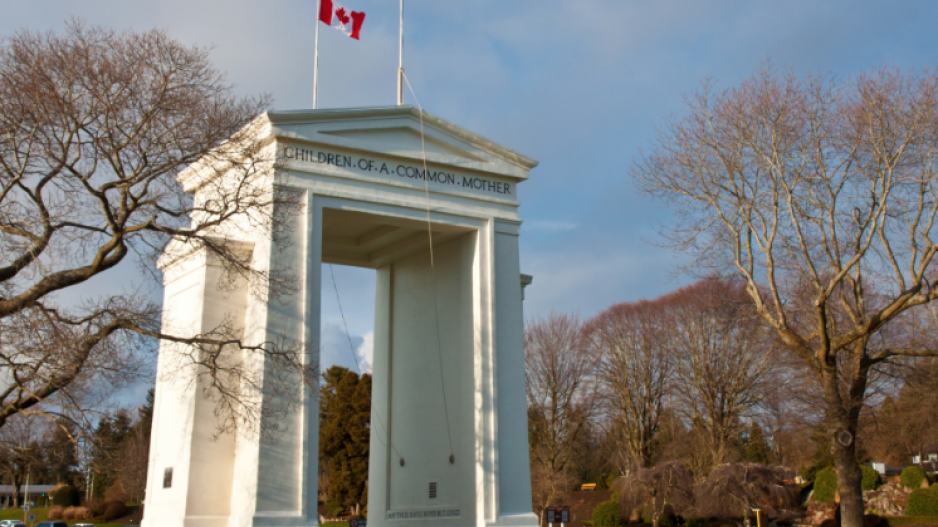Craft beer, rainy weather and a proclivity for marijuana – medical or otherwise – might be the strongest cultural pillars uniting residents of B.C. and Washington state.
But the strong trade relations between the neighbouring province and state might soon be put to the test with the swearing in of Donald Trump as U.S. president.
The new administration has made clear it’s intent on either renegotiating the North American Free Trade Agreement (NAFTA) or even tearing it up.
If the latter prevails, Chris Jacobs, managing partner at the Opportunity Northwest consulting service, said B.C. could emerge as a winner.
“It’s pretty easy to imagine that as protectionist policies come into play on Asian and Latin American markets that there’d be a vacuum left with some of the products. At least the products from those markets, the price would be ratcheted up so much that the American consumer would be looking for something more inexpensive,” said Jacobs, whose Bellingham, Washington, firm advises Canadian companies on how to enter the U.S. market.
Jacobs’ typical client is a profitable mid-size company either in the food industry or in light manufacturing.
“They could be set up to take advantage of temporary gaps in the flow of goods and/or services” if Trump’s protectionist policies are focused primarily on Mexico, Jacobs said.
“Right now if they set up a U.S. subsidiary and had a U.S. agent employed by that subsidiary, I think it would be very hard for the new administration to do anything negative for that company.”
Jacobs is working under the assumption that 1989’s bilateral free trade agreement between Canada and the U.S. would come into play if the NAFTA were dissolved.
Canada’s ambassador to the U.S., David MacNaughton, said as much in November in the wake of Trump’s win.
“Any changes would be slow because the supply lines are pretty well established between the U.S. and Canada,” said Andrew Cassey, an associate professor of economics at Washington State University.
He emphasized his opinions don’t reflect the position of his university.
Cassey said fluctuations in currencies and wages would likely have a much bigger impact on trade between Washington state and Canada than any political changes. But he said it’s very unlikely wages in Canada would fall significantly enough to attract additional interest from American companies looking to move manufacturing from Mexico and into Canada, where the 1989 bilateral trade agreement could theoretically go back into effect.
And looking to China to fill a gap in the export market resulting from the dissolution of NAFTA may prove to be a fruitless endeavour for Washington state.
China accounted for 22.6%, or US$19.5 billion, of the state’s exports in 2015, according to the U.S. Census Bureau. Canada accounted for 9.3%, or US$8 billion.
Cassey said it’s important to remember that Canada and the U.S. trade similar products between each other, and those products are going into similar markets.
“It’s largely a different type of relationship than China.”
Cassey added that Washington state and China trade products that Canada and Washington state typically do not.
And it would also likely be painful for the province to rely on China if trade with Washington state dropped dramatically due to new policies from the Trump administration.
The U.S. remains B.C.’s “No. 1 trading partner by a wide margin,” according to Ken Peacock, chief economist at the Business Council of British Columbia (BCBC). BCBC data provided to Business in Vancouver shows the province exported $5.1 billion to Washington state in 2015, making it B.C.’s largest trading partner in the U.S.
That number is nearly equal to the amount B.C. exported to China that same year ($5.9 billion).
“Over the past few years B.C.’s exports to the U.S. have grown steadily, boosted by the weaker dollar and the fact the U.S. economy has gained some traction,” Peacock said.
He added that Washington state’s proximity and its appetite for natural gas are the primary reasons behind the significant exports. Whatever develops between B.C. and Washington in terms of trade, Cassey said, “it won’t be as simple as just Trump trying to increase tariffs to Mexico.
“There’s going to be a shakeup in globalized trade patterns,” he said. “And some of that might be because of political changes, but some of it might just be all of the benefits of global trade have just been [tapped out].”
@reporton



